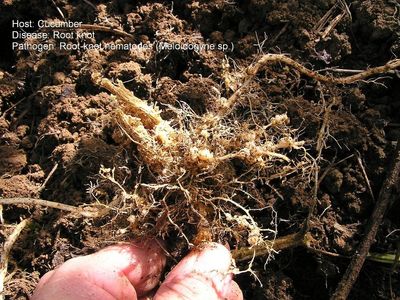Signs of Nematodes in Cucurbit Plants
Unfortunately, most cucurbits are highly susceptible to infestation by nematodes, microscopic worms that live in the soil. Of particular concern are root knot nematodes and sting nematodes. Among the cucurbits, watermelons are the least susceptible to damage from the root nematodes, but any plants in this family may be attacked and damaged. When nematodes of cucurbit crops attack the roots, the symptoms of infestation include stunted growth, leaf yellowing, and premature wilting. When the plant is given water, it takes longer than usual to recover. The roots develop galls, or knots, when infested with root knot nematodes. Sting nematodes cause the roots to be stunted and grow as dense mats. When symptoms begin to appear depends on environmental conditions and the degree of infestation. If plants have good conditions, you may not see signs of nematodes until later in the season, but if conditions are not great and the nematodes are plentiful, plants may start to decline very early, even as seedlings.
Cucurbit Nematode Control
It can be difficult to completely eliminate nematodes, but good management practices can help you keep infestations manageable and recover good crop yields. Crop rotation is one of the most important practices in cucurbit nematode control. If you see an infestation this year, plant something that is not susceptible in that area next year. Another thing you can do before planting next year is to prepare the soil using an appropriate pesticide. It also helps to plow the soil deeply, which reduces nematode populations. You can try to heat the soil using clear plastic on a sunny day, but this is less effective at killing nematodes than using pesticides. Control weeds that play host to these nematodes to further manage infestations such as pigweed, nightshade, and nutsedge. To try to save your crop this year when your cucurbits are showing signs of infestation, provide plants with the most optimal conditions. Extra water and fertilizer can help the plants continue to produce a decent yield. The nematodes prevent the plants from absorbing as much water and nutrients as they normally would, so providing more can help them grow and produce more.
